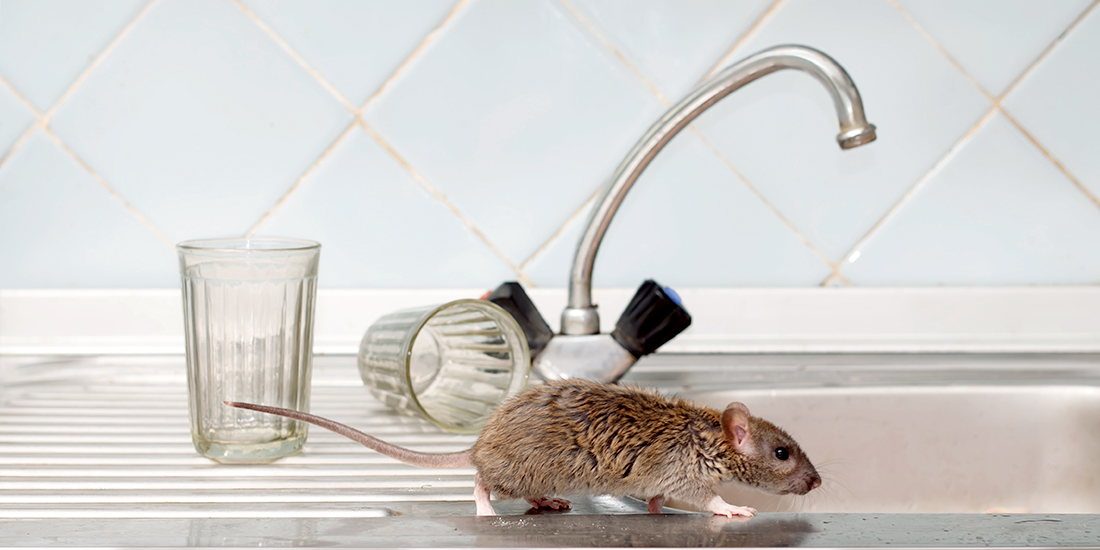
Q: I’ve been hearing strange sounds in the walls of my home and I’m worried some critters have taken up residence. How should I deal with a possible pest problem?
A: Pests like rodents and insects present serious health and safety risks. There has been significant effort lately to slow the spread of COVID-19, but the proliferation of pests during the pandemic brings its own health problems. That’s why professional pest control has been listed as an essential service by Washington state.
What’s Wrong With Rats?
The World Health Organization recognizes over 30 pathogenic bacteria, viruses, protozoa, and helminths spread by rodents alone. The most infamous, Hantavirus, is pervasive in the Northwest. Its local variety has a mortality rate of about 50% and no known treatment or cure.
With more people staying indoors, rodents can safely and openly wander in broad daylight. Many food and water sources, like restaurants, are closed and fewer garbage cans are out, so mice and rats are looking for new sources. Without ongoing control efforts, they’ll go where these items are readily available: our homes.
Your garbage cans, recycling bins, and compost piles are grocery stores to rats and mice. Make sure garbage bin lids are securely covered and keep compost bins tightly lidded. Do not compost meat, eggs, or dairy products, as these will attract rodents and raccoons. Bird feeders are also rodent feeders—use feeders with catch-basins to capture errant seeds before they hit the ground.
Another major food source is your pet’s food and water. Make sure to bring all dog and/or cat bowls inside as soon as they’re done eating. And last but certainly not least, make sure to keep all bushes and trees cut back away from your home’s foundation, siding, and roofline. Plants provide safe hiding spots, harborage areas, and access to roofs and attics.
There are many infestation signs to look out for—droppings, scratching or scampering sounds in walls and crawl spaces, and pets scratching at the floor or barking at the ceiling. Rodents also gnaw holes, leave smudge marks on surfaces, and burrow under the foundation. If you notice any of these signs, call a professional.
Keeping Out Insect Invaders
There have been significant outbreaks in the U.S. caused by insects, most notably West Nile virus (mosquitos) and lyme disease (ticks). Fortunately for us, Washington has not been impacted by these pathogens.
But we do have some problematic insects here. Common flies carry diseases such as salmonella, while others, like cockroaches, molt their “skins,” leaving tiny particles that can cause asthma flareups—not something you want paired with a respiratory pathogen like COVID-19. And wasps, especially yellow jackets, have nasty stings that send some people to hospitals with allergic reactions.
Yellow jackets and hornets are largely dormant in the winter, but by late summer their nests can number in the thousands. Different wasp species nest in different locations—in soil, inside old timbers or rockeries, suspended beneath bush and tree branches, under roof eaves, and inside wall voids and attics in our homes.
Right now, it’s a good time to slowly walk around the perimeter of your home and watch for insects consistently traversing the same area. They will seem to line up like planes at the airport, queuing up for the landing zone. Chewing and crunching noises coming from the wall or ceiling inside is also a bad sign; it means you’re likely dealing with rodents, ants, or yellow jackets. Whatever you do, DO NOT press on the wall at that spot. If you suspect yellow jackets, get professionals out immediately before the wasps scratch their way through the sheetrock and expose their entire nest to your living space.
Pest Control and COVID-19
During these trying times, pest control companies must strive to keep customers and technicians healthy and safe. Any company you decide to hire should limit interior visits to situations where inside work is completely necessary, such as treatment of active infestations, trap setting, and dead rodent removal. While inside, they should socially distance and wear masks, gloves, and shoe covers. It’s vital they disinfect any surfaces they touch—even with the gloves on!
Eliminating pest infestations is difficult work right now, but no less crucial. Working together, we can keep both pests and COVID-19 under control. Stay healthy!
Aleah Treftz is public relations manager at Cascade Pest Control, a member of the Master Builders Association of King and Snohomish Counties (MBAKS). If you have a home improvement, remodeling, or residential homebuilding question you’d like answered by one of MBAKS’ more than 2,600 members, write to homework@mbaks.com.